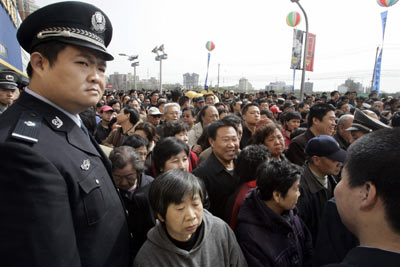
A Chinese
policeman watches as customers surge during the opening of Ikea store in
Beijing April 12, 2006. Chinese consumers' spending on furniture
surged 40.1 percent after climbing 15.7 percent in April.
[Reuters/file] |
The world's fastest growing economy is now powered by rising domestic
consumption, as Chinese official statistics said that retail sales in May
galloped by an unprecedented speed.
China retail sales rose at the fastest pace in 17 months in May, the
government said Tuesday, as increasing incomes spurred domestic spending on
cars, furniture, electronics, clothing and daily necessities.
Sales in May hiked by 14.2 percent to 617.6 billion yuan (US$78 billion),
after jumping 13.6 percent in April, the National Bureau of Statistics said.
There are talks in foreign press that Chinese urban households, encouraged by
bulging pockets, are now buying cars just like they eat dumplings.
Spending on furniture surged 40.1 percent after climbing 15.7 percent in
April. Sales of electronics increased 26.6 percent, up from April's 17.6 percent
gain, and vehicle sales jumped 29.4 percent after rising 26.3 percent the month
before.
The State Council headed by Prime Minister Wen Jiabao has cut taxes, raised
minimum wages and pledged to improve health care and welfare to support
consumption and make the economy less dependent on investment.
And, analysts believe that stronger consumer spending could give the central
bank, the People’s Bank of China (PBC), more leeway to raise lending rates as it
seeks to curb investment.
"This indicates that the central bank can afford to take more measures to
tighten monetary policy, because consumption is now more providing more support
to the economy," said Ma Jun, an economist at Deutsche Bank, according to a
Bloomberg News report.
PBC, while raising the benchmark lending rate by 0.27 percentage point to
5.85 percent on April 28 to cool bank lending for investment projects, the real
estate sector especially, kept the official deposit rate unchanged, to
discourage savings.
Per-capita disposable incomes in towns and cities increased 10.8 percent in
the first quarter, while rural incomes jumped 11.5 percent. China's economy grew
10.3 percent in the first quarter.
Ikea, the world's largest
home-furnishings retailer, plans to open two to three stores in China each year
during the next 10 years, the company's chief executive, Anders Dahlvig told
reporters earlier this month, according to the Bloomberg News report.
Efforts by the government to curtail piracy may encourage more overseas
companies to expand in the nation, bolstering consumer spending, economists
said.
European luxury goods makers of brands including Chanel, Gucci and Louis
Vuitton signed an agreement last week with Beijing retailers to stop the sale of
counterfeit bags and clothing in malls.
China's savings rate has been at almost 40 percent of gross domestic product
during the past two decades and stands at more than 45 percent now, the UBS
economist Jonathan Anderson said in a June 6 note to clients. Average incomes in
urban areas are about triple those in the countryside, the Bloomberg News
reported.